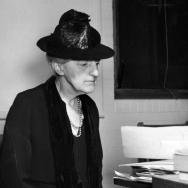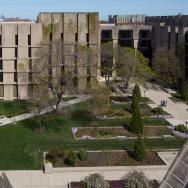A pandemic. Racism and racial strife. Anti-immigration policy. The right to vote. These sound like topics from today’s news, but they also made headlines 100 years ago—bookending the past century with a combination of a global health crisis and societal upheaval. At the beginning of this period, two fearless women did something radical and unique, revolutionizing the nascent profession of social work.
In 1920, Edith Abbott and Sophonisba Breckinridge founded the University of Chicago School of Social Service Administration, one of the first graduate schools of social work in the country. Their focus was for SSA to advance the profession through a combination of practical theory, social science theory and research.
This was a bold vision. The two UChicago alumni believed that, in order to professionalize the field, an education in social work and social welfare should be grounded in first-rate research. Moreover, they believed social change would occur only when research guided practice and policymaking.
SSA has since become the premier training ground for social welfare scholars, transforming doctoral education through its curriculum, research instruction and its vibrant learning community. With help from faculty, PhD students examine social issues through an interdisciplinary lens and the most rigorous research methods. This commitment to evidence-based research and community-engaged scholarship has made direct and enduring impact, both in academia and beyond.
“The influence of our program is far-reaching,” said Prof. Julia Henly, chair of the doctoral program. “Over five hundred alumni have graduated from SSA’s doctoral program. They have become deans, professors, research scientists, and top-level administrators in government, nonprofits, and other organizations. Our graduates are the thought leaders of the field.”
SSA traces its beginnings to 1908, when Graham Taylor—a minister and founder of the Chicago Commons settlement house—opened the Chicago School of Civics and Philanthropy. Its purpose: to address the growing need to train “efficient helpers” for settlement houses and other social service agencies trying to meet the needs a fast-growing city.
Abbott, an economist, was recruited from her teaching position at Wellesley College to become the assistant director. Breckinridge, a political scientist who was teaching at UChicago’s Department of Household Administration, assumed leadership of the expanding research department. Both were well-known for their research at Jane Addams’ Hull House, founded in 1899 as one of the first social settlements in the country.
Abbott, PhD’1905, and Breckinridge, PhD’1901, JD’1904, developed and deepened the existing curriculum but were concerned about the lack of professionalization of the field. Aligning the school in a degree-conferring university, the founders believed, would elevate the stature of social workers and beget the respect they deserved. “A good professional school of social welfare not only needs a close connection with a good university,” Abbott said, “but the modern university also needs such a school.”
Breckinridge was the key strategist in leading the Chicago School’s consolidation with the UChicago. On Oct. 1, 1920, the new University of Chicago School of Social Service Administration became the first school of social work affiliated with a major research university. This partnership was a key element of the vision shared by Abbott and Breckinridge, authorizing SSA—which had been training social workers as the independent Chicago School—to offer master’s and doctoral degrees. Abbott was especially enthusiastic about the merger: “Only in a university—and only in a great university—could a school of social work get the educational facilities that advanced professional students must have if they were to become the efficient public servants of democracy.”
SSA championed an interdisciplinary curriculum that was unheard of at the time. Students were expected to understand legal concepts, the social implications of medical problems, and the fields of public social service, social research and social administration. Adapting what she had learned as the first woman graduate of the University of Chicago Law School, Breckinridge incorporated the case method to courses.
In 1924, Abbott was named SSA’s first dean, becoming the first female dean of any graduate school in the United States. She continued making innovative changes at SSA, integrating the University’s resources, strategically building a faculty and, along with Breckinridge, launching the journal, Social Service Review.
Abbott conferred SSA’s first doctoral degree in 1924 to Helen Rankin Jeter. Breckinridge, also the first female graduate of the University's doctoral program in political science, mentored Jeter and edited her dissertation, “The Chicago Juvenile Court.”
Today, SSA students conduct research on issues affecting diverse populations in the U.S. and around the world. Studying everything from child welfare to homelessness to policing, their work impacts the lives of immigrants and refugees, low-income workers and many other underserved groups. A critical focus of doctoral research at SSA is the documentation and mitigation of racial, ethnic and gender inequities in policies and programs, as well as the pivotal contributions that marginalized populations have made to social change.
The requirements for a doctoral degree have changed over time, but one written into the earliest editions of the SSA Announcements remains constant: The degree is given “as the recognition and mark of high attainments and ability in the candidate’s chosen province.”
And though many research topics are seemingly intractable problems with long historical roots, today’s doctoral students and alumni honor the scholars before them while pushing the field of social work into the future—toward a more just and inclusive society.
—Excerpted and adapted from a story first published by the School of Social Service Administration.

